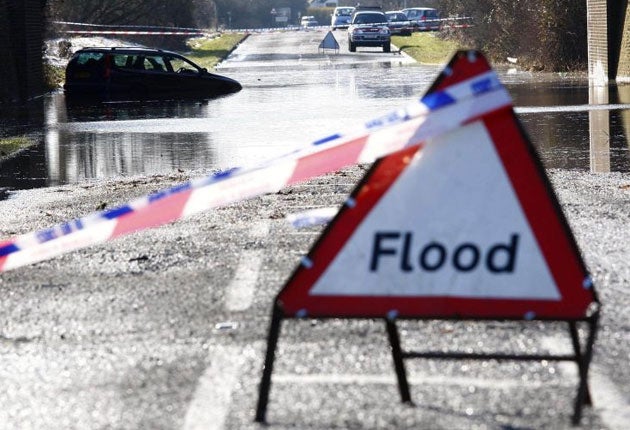Tempting fate – the millions who want to cut back on their cover
As research reveals a desire to scale back on household, motor and flood insurance in response to the recession, Kate Hughes looks at the risks

Your support helps us to tell the story
From reproductive rights to climate change to Big Tech, The Independent is on the ground when the story is developing. Whether it's investigating the financials of Elon Musk's pro-Trump PAC or producing our latest documentary, 'The A Word', which shines a light on the American women fighting for reproductive rights, we know how important it is to parse out the facts from the messaging.
At such a critical moment in US history, we need reporters on the ground. Your donation allows us to keep sending journalists to speak to both sides of the story.
The Independent is trusted by Americans across the entire political spectrum. And unlike many other quality news outlets, we choose not to lock Americans out of our reporting and analysis with paywalls. We believe quality journalism should be available to everyone, paid for by those who can afford it.
Your support makes all the difference.Five million of us are planning to cut back on home and car insurance this year in a bid to trim our household costs, according to research by insurer LV=.
Home cover is the most likely policy for the cull, with more than two million of us either reducing or cancelling it, says LV=. Car insurance is next on the chopping block, it seems. Swinton reports a sharp rise in the number of drivers opting for inferior third-party cover rather than going fully comprehensive. But while scaling back insurance may seem a good way of dealing with the problems thrown up by recession, it’s a course of action that could leave consumers facing huge bills and even fines later on for the sake of a few pounds a month off their premiums.
“It’s understandable that people are looking at ways in which they can reduce their outgoings,” says John O’Roarke, managing director of general insurance at LV=. “However, cancelling or reducing essential cover could result in many people finding themselves seriously out of pocket if something untoward happens.”
Almost 30 per cent of home and contents policyholders are thinking of removing flood cover from their insurance, but incidents of extreme weather look set to increase as a result of climate change, and swollen rivers are not the only danger. In just the past few weeks, burst pipes caused by the cold weather have led to over £15m worth of flood damage claims.
Doing without this cover may save you 2 or 3 per cent on your monthly premiums – more if you live in a “high risk” area – but the average cost of flood damage is £17,000. And insurance specialists warn that you’ll also find it more difficult to get a policy in the future – not only because your home is clearly at risk of flooding again, but also precisely because you didn’t have cover in place when it happened.
House insurance is usually a contractual obligation for mortgage holders, and a comprehensive buildings and contents policy that replaces old items with new and covers the rebuild value resulting from any damage is crucial, says Peter Gerrard, head of insurance for independent advice site Moneyextra.com. But there are ways to make big savings, he adds: “Improving security at your home with a burglar alarm can knock 2 or 3 per cent a year off the cost of your policy. And adding locks approved by the British Standards Institute, widely available for just a few pounds, can shave off another 2 or 3 per cent.”
Meanwhile, according to the LV= research, 37 per cent of people cutting back on insurance say they are considering at least downgrading their car cover. This could be a hazardous move because if they are caught without the right insurance, motorists risk a fine of £5,000, disqualification and the car being seized and crushed. What’s more, the chances of being caught driving without insurance are far higher than in the past as the police are now armed with numberplate- recognition technology that allows them to see if a car has cover or not.
When it comes to saving cash, a common misconception is that only taking out third-party motor insurance will automatically cut the cost, when in reality premiums are often comparable with comprehensive cover. This is because the premium you pay is based on the risk you pose as the driver, rather than the cost of covering the car, explains Mr Gerrard. “If you only opt for third-party cover then not only will you have to pay for damage to your own car, but your premiums will go up as well after the accident,” he says.
“Increasing your excess – the maximum cost you are prepared to cover before the policy kicks in – is also a popular way of cutting your premiums. The savings are significant and can mean a difference of 10 per cent or more in the cost,” he continues. “But this is far better for those who only use their cars once or two days a week, and not at peak times. It’s a false economy for someone who races up and down the M4 every day. And if your car is only worth £500 in the first place, say, it makes no sense to have an excess threshold that high.”
For real savings on your motor cover, and indeed any insurance, always shop around for the best deal. Scouring the market could save you £330 a year on average on a car policy alone.
Join our commenting forum
Join thought-provoking conversations, follow other Independent readers and see their replies
Comments